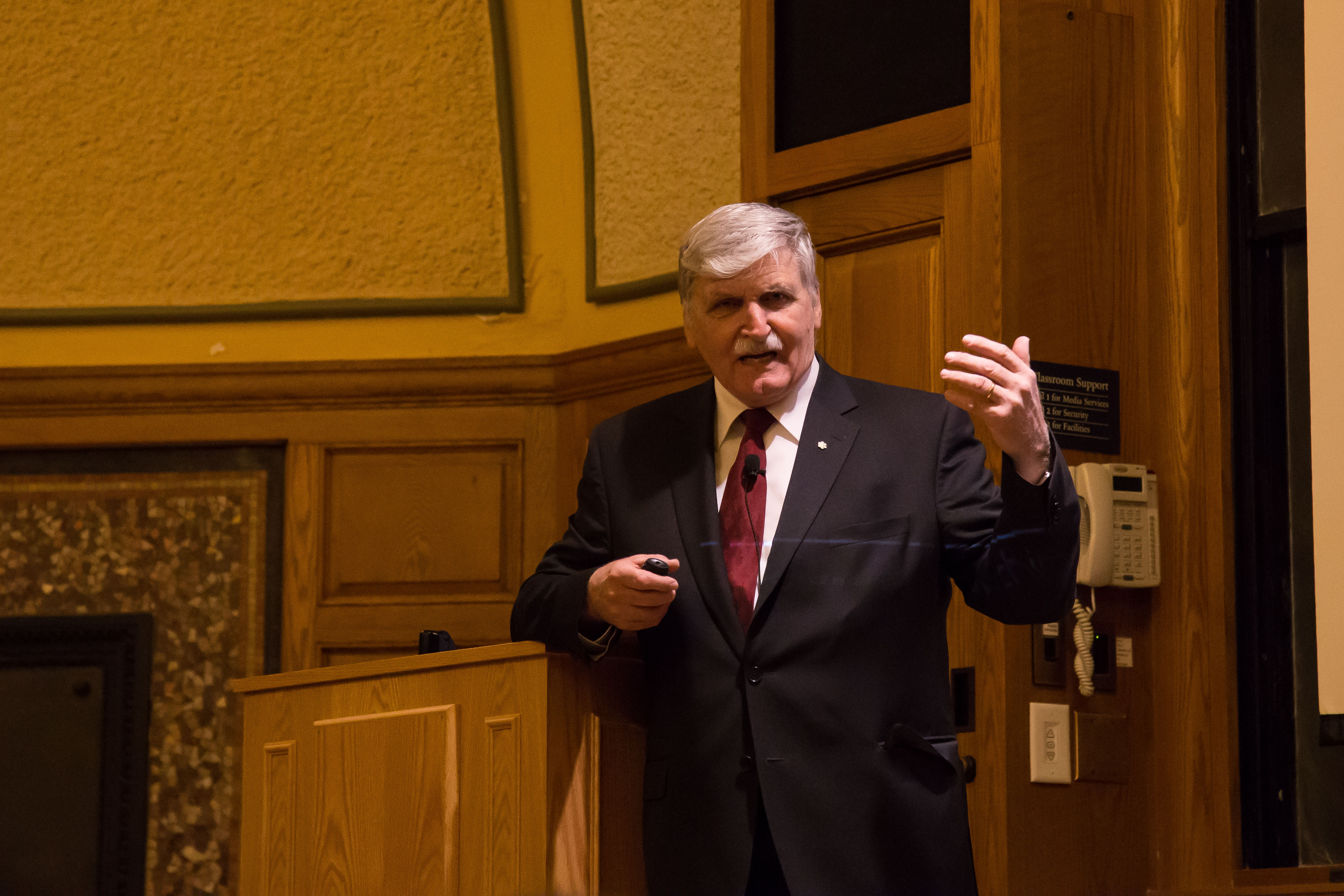
Retired United Nations Commander Roméo Dallaire spoke Wednesday to an audience of about 75 students on the United Nations’ “Responsibility to Protect” doctrine and how the next generation should approach genocide prevention.
Dallaire served as the commander of the United Nations’ peacekeeping mission in Rwanda prior to and during the country’s 1994 genocide. His talk was the first in a new series of annual lectures hosted by the Yale Genocide Studies Program on atrocity prevention. Program Director David Simon told the News he chose Dallaire as the inaugural speaker because his story is “tremendously important” in considering how the world should react to human tragedy.
Beginning with a joke about how the audience could not avoid a PowerPoint and military organization charts when hearing from a soldier, Dallaire spoke about the emergence of new weapons like child warfare and rape and about his goal to eradicate the use of child soldiers. Recounting his experience with the Rwandan genocide, Dallaire encouraged the audience to see that “frictions of our differences” as humans can be resolved without conflict. He also asked attendees to think of new ways to implement the responsibility of all humans to protect each other — a responsibility the UN codified in its 2005 “Responsibility to Protect” commitment.
“The future is a lot closer than you think,” Dallaire said. “If you’re not handling or leading the future to shape it, you’re just going to be surviving it, and I don’t think that’s the future we want to create.”
While the “Responsibility to Protect” was established over a decade ago, Dallaire argued that it has yet to be actually implemented in the world’s conflicts. He pointed out that with the existence of horrors like poverty, global terrorism and the “stupid capability that is nuclear warfare,” the world is at a disadvantage in trying to prevent atrocity.
But he reaffirmed humans’ shared duty to protect each other. To illustrate this point, Dallaire drew on his experiences in the Rwandan genocide.
“We had found this little, seven-year-old boy in the middle of the genocide, and I picked him up. There were flies all over him, he was in rags and his stomach was bloated, but I looked into his eyes and I saw humanity,” Dallaire said. “I saw the same thing I saw in the eyes of my seven-year-old son … He was the same, he was human, he was not inferior. We are all equal, and look at how we’ve been reacting to conflicts, the pecking order we’ve established.”
In the face of new weapons like rape and child warfare, Dallaire encouraged the audience to take advantage of new tools, like the internet and other technologies, to coalesce. With Skype, for example, humanity will be able to talk to and influence itself for the first time, he said.
Drawing attention to world powers that have “picked and chosen wars,” Dallaire also argued that the world is in need of strong leaders who are willing to put the needs of their countries’ citizens first.
He ended the lecture with the idea that non-governmental organizations, combined with the emerging youth, are the answer to the world’s conflicts. Dallaire said that NGOs “touch everything and are there before, during and after” a conflict, allowing them to be the voice of the people. While audience members do not need to join an NGO to make a difference, they still should not be comfortable with the status quo, he said. He urged them to innovate, create and lead in “this multidisciplinary world,” not only to resolve conflicts but also to prevent them.
Attendees interviewed agreed that education is important to resolving and preventing conflicts, but they questioned some of the premises of Dallaire’s remarks.
Josiane Mumukunde, a research assistant at Kline Biology Tower and a student at Gateway Community College, was 12 years old and living in Rwanda when the genocide occurred. While she said she generally agreed that armed forces should not be the first solution to a problem, she pointed out that conflict cannot always be resolved without violence, due to systemic problems like poverty and lack of education that build up in addition to ethnic tensions.
Frances Fagan ’17 said she was surprised to hear Dallaire say that the “Responsibility to Protect” has not yet been implemented. But she added that rather than trying to create new, potentially expensive systems to implement it, decision-makers should modify appropriate systems already in existence.
“When it comes to humanitarian intervention, I agree with [Dallaire’s] point that it’s not in any state’s self-interest to assume that conflict happening ‘over there’ is not affecting it,” Charlotte Hulme GRD ’21 said. “But I do think it’s a lot easier said than done.”
The Yale Genocide Studies Program’s new lecture series is funded by a recent donation from the Charles E. Scheidt Family Foundation.







